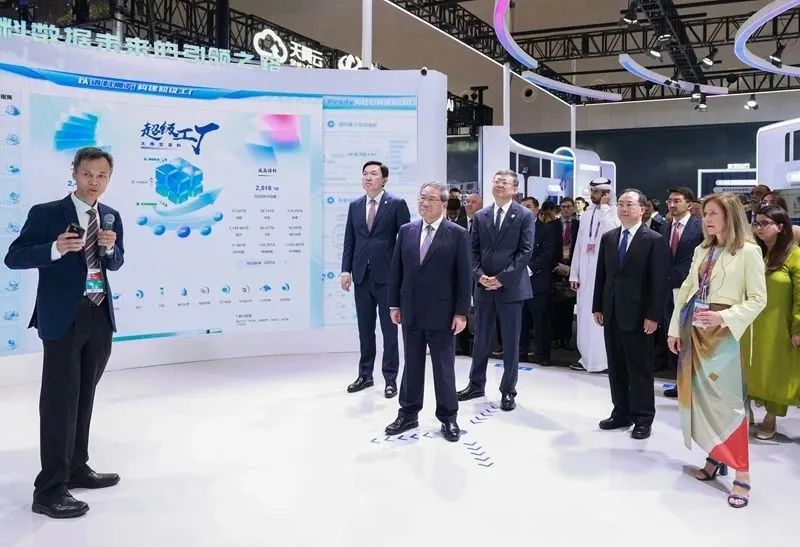小i导读
2025年7月26日至29日,以“智能时代 同球共济”为主题的世界人工智能大会暨人工智能全球治理高级别会议(WAIC)在上海召开,展示了人工智能技术从算法模型到具身智能、从应用落地到硬件变革的全链条创新成果。
北京大学国际关系学院长聘正教授、中外人文交流研究基地执行主任王栋,北京大学中外人文交流研究基地研究助理张学玉撰文认为,全球人工智能治理虽然取得了一定进展,但也面临着结构性张力与挑战,因此需要构建系统性、前瞻性、包容性的人工智能治理体系。为应对人工智能技术快速发展带来的变革与风险,中国在2025年世界人工智能大会上系统阐述了其全球治理主张。该理念强调协商对话而非技术对抗,主张共同安全而非单边垄断,不仅回应了全球南方国家对公平技术秩序的呼吁,也为国际社会提供了在治理分裂、信任缺失背景下可行的合作路径。
本文约2000字,读完约7分钟
当前世界正处在新一轮科技革命与产业变革的交汇点,人工智能(AI)既是国家竞争的关键变量,也是助推全球生产力与发展水平提升的重要引擎。2025年7月26日至29日,世界人工智能大会暨人工智能全球治理高级别会议(WAIC)在上海召开,大会以“智能时代 同球共济”为主题,展示了人工智能技术从算法模型到具身智能、从应用落地到硬件变革的全链条创新成果。在技术产业空前活跃的同时,人工智能治理这一基础性、迫切性议题也是本次大会的关注焦点。
The world is at the crossroads of a new scientific and technological revolution and industrial transformation. Artificial intelligence is not only a key variable in national competition but also an important engine for boosting global productivity and development.
In late July, the World Artificial Intelligence Conference & High-Level Meeting on Global AI Governance was held in Shanghai. Themed “Global Solidarity in the AI Era,” the conference showcased the full-chain innovation achievements of AI technology, from algorithmic models to embodied intelligence, practical applications and hardware transformation.
近年来,全球人工智能治理已取得一定进展,逐步从原则倡导走向制度探索,治理格局呈现出三大特征:其一,治理共识不断增强,国际社会普遍意识到人工智能的技术复杂性与潜在风险,技术安全成为与发展并重的议题;其二,制度建设持续推进,联合国及其相关机构相继出台或通过《未来契约》《全球数字契约》等治理规则与倡议,推动全球治理基础初步形成,多边合作氛围日益浓厚;其三,区域治理路径加快成型,美欧、中国、东盟等根据各自国情构建了相对成熟的技术发展与监管体系,治理实践呈现出多样化探索态势。
Amid the unprecedented dynamism of the technology industry, the foundational and urgent issue of AI governance was also a key focus of this year’s event. In recent years, global AI governance has made progress, gradually shifting from advocacy in principle to institutional exploration. The governance landscape now has three distinct features:
• First, consensus is strengthening steadily. The international community generally recognizes the complexity and potential risks of AI technology, and technology safety has become a topic of equal importance alongside development.
• Second, institutional development is advancing. The United Nations and related agencies have successively introduced or adopted governance frameworks and initiatives such as the Global Digital Compact, laying the foundation for a global governance framework and fostering a stronger atmosphere of multilateral cooperation.
• Third, regional governance paths are rapidly taking shape. The United States, Europe, China, ASEAN, and others show relatively mature technology development and have built regulatory systems based on their own national conditions. They present a landscape of diverse exploratory practices in governance.

新华社7月29日拍摄的“WAIC里技能大舞台”,多款机器人在此进行技能展示。
与此同时,人工智能治理也面临着结构性张力与挑战。在技术目标上,部分国家将人工智能优势视作地缘竞争工具,而广大发展中国家则更关注技术公平与普惠。在发展路径上,对颠覆性突破的追求可能推动“智能体”与生成式人工智能在缺乏监管与充分理解的条件下被开发部署,埋下系统性隐患。在应用层面,人工智能军事化趋势不断加剧,但全球尚无有效机制对自主武器系统的开发与使用加以约束,危机升级风险与伦理盲区并存。
At the same time, AI governance continues to face structural tensions and challenges. In terms of technological objectives, some countries view AI superiority as a tool for geopolitical competition, and a broad range of developing countries are focusing on technology equity and inclusiveness.
In terms of development paths, the pursuit of disruptive breakthroughs may lead to the deployment of agents and generative AI systems under conditions with inadequate regulation and understanding, planting the seeds of systemic risk. At the application level, the trend of militarization in AI continues to intensify, yet the world continues to lack effective mechanisms to constrain the development and use of autonomous weapons systems. This leaves room for both the escalation of crises and the emergence of ethical blind spots.
因此,构建系统性、前瞻性、包容性的人工智能治理体系,不仅是对当前风险的理性回应,更是确保技术向善、服务公共利益的必要前提。当前人工智能技术正处于指数级发展的风口期,必须构建“软缰绳”来驾驭“快马”,防止技术失控带来不可逆后果。同时,全球人工智能发展也呈现出明显的“技术南北鸿沟”,技术、算力、人才与标准集中于少数发达国家,南方国家在技术获取与自主发展方面仍面临重重挑战,技术依附风险上升,如何捍卫技术主权、实现包容性发展成为亟待破解的议题。最后,人工智能的颠覆性技术决定了它既有巨大潜力造福于人类,也可能对人类社会构成破坏性影响,因此必须及时通过治理引导技术“向善”,最大化其公共收益并最小化潜在危害。
Therefore, building a systematic, forward-looking, and inclusive AI governance system is not only a rational response to current risks but also a necessary prerequisite for ensuring that technology is used for good purposes and in service of the public interest. As AI technologies are entering a period of exponential development, it is imperative to construct “soft reins to steer the fast horse,” so as to avoid irreversible consequences from a technological runaway.
At the same time, global AI development presents a clear technological North-South divide. Technologies, computing power, talent and standards are concentrated in a few developed countries, while the Global South still faces considerable obstacles in technology access and independent development. The risks of technological dependency are on the rise, making the defense of technological sovereignty and the realization of inclusive development urgent issues to be addressed.
Ultimately, the disruptive nature of AI holds both enormous potential to benefit humanity and serious risks of harm. Timely governance is essential to guide AI toward the good — to maximize its public value and minimize its potential harms.

7月26日,国务院总理李强在上海出席2025世界人工智能大会暨人工智能全球治理高级别会议开幕式后,同与会外方嘉宾、国际组织代表共同巡馆。
鉴于人工智能技术快速发展所带来的深刻变革与潜在风险,中国在2025年世界人工智能大会上系统阐述了其全球治理主张,围绕“普及普惠、创新合作、共同治理”三大目标,提出构建包容、公正、负责任的全球人工智能治理体系,不仅回应了国际社会对技术安全、公平可及和伦理规范的关切,也体现出中国作为负责任大国在全球治理体系中的制度性参与和价值引领。中国国务院总理李强在本次大会上强调应将人工智能视为全球公共产品,坚持开放共享与智能平权,帮助世界各国特别是全球南方国家加强能力建设并助力其现代化发展,使技术成果进一步惠及全球。在技术合作方面,中国呼吁各国推动开源开放,倡导协同创新,突破技术竞争带来的信任赤字。在制度构建上,中国倡议成立世界人工智能合作组织,进一步深化创新、推动技术普惠发展并加强协同共治。
In light of the profound changes and risks brought about by the rapid development of AI technologies, China systematically elaborated its global governance vision at the 2025 World Artificial Intelligence Conference. Centered on three core goals — universality and inclusiveness, innovation and cooperation, and joint governance — China proposed the establishment of a fair, inclusive and responsible global AI governance system. This was not only a response to the international community’s concerns over technological safety, equitable access and ethical standards but also reflects China’s institutional participation and leadership in values as a responsible major country in the global governance system.
Chinese Premier Li Qiang emphasized at the conference that AI should be regarded as a global public good, and that openness, shared access and intelligent equality should be upheld. He called for helping all countries — especially those in the Global South — to strengthen capacity building and support their modernization, so that the fruits of technological progress can benefit the world more broadly.
In terms of technological cooperation, China advocated open-source and collaborative innovation to overcome the trust deficit brought by technology competition. On the institutional front, China proposed the establishment of a global AI cooperation organization to deepen innovation, promote inclusive technological development and strengthen joint governance.
如果说第一次全球化由航运技术驱动,第二次全球化由互联网革命主导,那么以人工智能为代表的智能技术则有望驱动第三次全球化浪潮。中国的人工智能治理理念强调协商对话而非技术对抗,主张共同安全而非单边垄断,不仅回应了全球南方国家对公平技术秩序的呼吁,也为国际社会提供了在治理分裂、信任缺失背景下可行的合作路径。在“智能时代 同球共济”的共识引领下,中国正以务实行动推动人工智能走向更加平衡、安全、普惠的发展轨道,通过人工智能赋能产业链重塑、社会治理转型与全球公共产品供给,使全球发展朝着更加智能化、公平化、可持续的方向迈进。
If the first wave of globalization was driven by maritime technology and the second by the internet revolution, then AI and other intelligent technologies are poised to drive a third wave. China’s AI governance philosophy emphasizes dialogue and consultation rather than technological confrontation and champions collective security over unilateral monopoly. It is responding not only to the Global South’s call for a fair technological order but is also providing a practical path for international cooperation at a time of fractured governance and declining trust.
Under the consensus theme — “Global Solidarity in the AI Era” — China is taking pragmatic action to steer AI toward a more balanced, secure and inclusive development path that enables the reshaping of industrial chains, the transformation of social governance and the delivery of global public goods. In doing so, it is contributing to a global development trajectory that is more intelligent, equitable and sustainable.
来源:中美聚焦